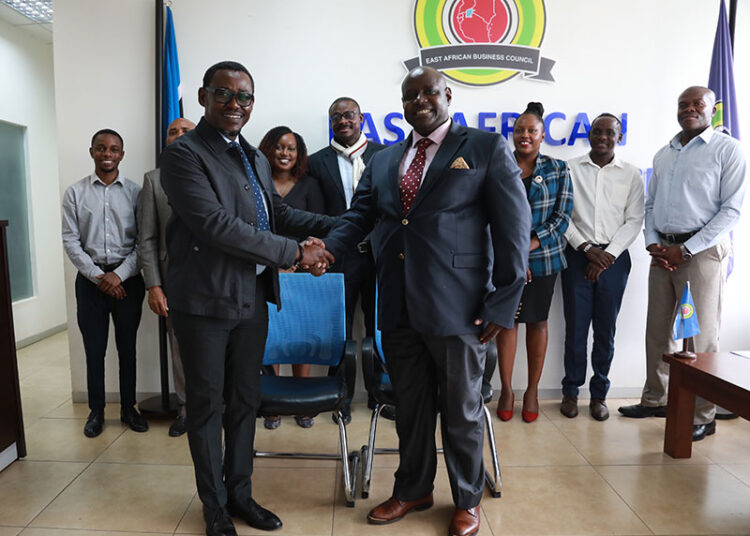East Africa Business Council (EABC) has called for the East African ports to fully utilize the information technology to be at par with global successful ports such as Singapore that rides on technology to drive their ports’ performance, especially in the transshipment business.
Addressing logistical challenges, Mr. John Bosco Kalisa, EABC Chief Executive Officer underscored the disparity in ship docking time between East African ports and Singapore.
Singapore boasts a remarkable ship time of just two days compared to the 15-day duration in East African ports. Bosco emphasized the need for the East Africa Community (EAC) bloc to embrace digitalization, transparency, and trade facilitation.
“Such measures will significantly reduce the cost of doing business in the region and enhance logistical performance. I challenge logistics sector players to promote digitization as a tool for facilitating trade through enhanced efficiency, transparency, and accountability,” Bosco said when the Federation of East African Freight Forwarders Associations (FEAFFA) paid a courtesy call to explore areas of collaboration with the EABC.
FEAFFA first Vice President Edward John Urio, who led his delegation to discuss potential collaborations and advancements within the freight forwarding industry in the EAC said that FEAFFA, in collaboration with other stakeholders has trained over 8,000 customs agents on the mandatory East Africa Customs Freight Forwarding Practicing Certificate (EACFFPC), providing a platform for strong collaboration.

This one-year mandatory training program is done jointly by the EAC Directorate of Customs, the East Africa Revenue Authorities (EARAs), and the national associations of the freight forwarding industry affiliated with FEAFFA. The federation has also launched the Continuing Professional Development (CPD) Program for customs agents in the region to keep them abreast of the constant dynamics in the industry.
FEAFFA is currently piloting the CPD program. To this end, FEAFFA, with support from TradeMark Africa (TMA), has built an integrated CPD Management system to support the piloting and eventual roll-out of the CPD program in the region.
During the meeting, Mr. Urio emphasized FEAFFA’s commitment to extending support to counterparts in the Democratic Republic of Congo, the latest entrant in the EAC bloc, and South Sudan, the second biggest transit market for Mombasa port after Uganda, aiming to facilitate mutual benefits and shared success through various programs.
“There is a great importance of deeper collaboration between FEAFFA and EABC, particularly in the domestication of the self-regulation bill known as the Model Customs Agents and Freight Forwarders Management Bill 2017. This regional model bill, developed by legal experts in the region, will serve as a guiding reference for EAC partner states in enacting national legislation to effectively govern freight forwarding operations,” Urio said.
In 2017, FEAFFA, with the support of the Japan International Cooperation Agency (JICA) developed the regional model bill to act as a template aimed at guiding the EAC countries in developing national customs agents and freight forwarders bills in their respective countries.
The bill, in various stages of development, covers aspects considered critical by a spectrum of industry stakeholders in ensuring a genuinely professional customs agents and freight forwarders sector like other professions.
Key among them includes the detailed establishment of a Regulatory Board, technical qualification and continuous professional development, Certification and Registration, Obligations and conduct of registered Customs Agents and Freight forwarders, the code of conduct, offenses, and penalties, disciplinary proceedings, appeals, mutual recognition agreements, and financial provisions.
President Urio said that the proposed model law is a game-changer as it will supplement government regulations by filling regulatory gaps, streamline the logistics sector by enhancing accountability, protect importers and exporters, protect consumers of goods and services, and significantly contribute to lowering the cost of doing business in the region. So far, five countries in the EAC have a draft bill that awaits review by parliament.
Mr. John Mathenge, Managing Director of Viaservice Limited and a Board Member of FEAFFA and its technical advisor shed light on the impact of logistics on the export competitiveness of the EAC bloc, especially within the context of the African Continental Free Trade Area (AfCFTA).
“There is a great need for positioning EAC freight forwarders and shippers to effectively compete with their international counterparts. There is also a need to capitalize on the opportunities presented by the continental market and fully comprehend the intricacies of the AfCFTA Trade in Services Agreement,” Mathenge said.
The FEAFFA delegation, comprising President Urio, Acting CEO Mr. Elias Baluku, and representatives from FEAFFA and the German Development Cooperation (GIZ), expressed optimism about the potential collaborations discussed during the visit. They believe that such partnerships will pave the way for a more vibrant and competitive freight-forwarding industry in East Africa.
This article was published by the editorial team at FEAFFA. For any enquiries, contact us via Email: freightlogistics@feaffa.com Tel: +254733780240





